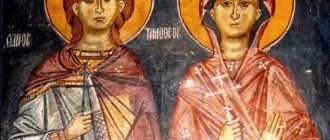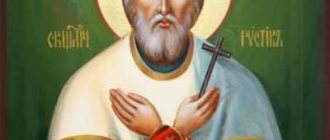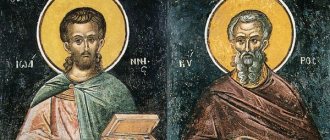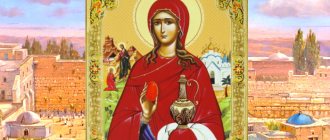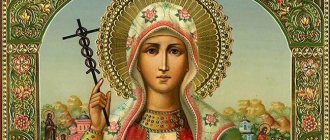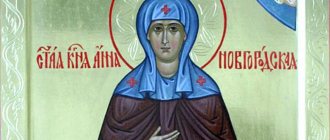Today, January 12, 2022, is an Orthodox holiday according to the church calendar - the day of remembrance of the holy martyr Anisia of Thessaloniki. And also the day of remembrance of St. Macarius of Moscow. And our wise ancestors called this day Anisin’s day.
For more details about the holidays according to the Orthodox calendar and what Orthodox Christians can and cannot do today, January 12, read the article.
Life of the Holy Martyr Anisia
The holy martyr Anisia of Thessalonica lived during the reign of Emperor Maximian, who hated Christians and gave the order to put to death everyone who did not renounce their faith and worship the pagan gods in the temples. The girl was born into a rich and noble family living in the city of Thessaloniki. The parents raised their daughter in the fear of God and from an early age instructed her in the Holy Scriptures.
When the girl grew up a little, her parents began to teach her the wisdom of books. Anisia had a lively mind and quickly grasped all science. Her angelic disposition was not inferior to the beauty of her face, but the girl was not proud of her attractiveness, her dreams were directed towards the heavenly, and she prayed to the Lord to quickly take her to the heavenly abodes.
When Saint Anisia's parents passed away into eternity, she had to make a difficult decision regarding inherited property. After her mother and father, she inherited untold wealth, which included not only gold and silver, but also vast estates, as well as a large number of slaves. The girl was saddened that with such wealth it would be difficult for her to enter the Kingdom of Heaven, and in her prayers she asked the Almighty to give her advice on how to deal with the inheritance.
After some time, she decided to sell everything that she inherited from her parents, and distribute the proceeds to the poor and donate to charitable causes. She did not haggle during the sale, but simply told the buyers that the money would be used to help the disadvantaged, and that they should set the price they were willing to pay.
When the inheritance was sold, Anisia went to give alms, she personally visited the dungeons and not only blessed the prisoners with everything they needed, but also personally bandaged their wounds. In this way, the holy martyr got rid of all wealth, which could have become an obstacle for her to enter the Kingdom of Heaven.
After this, Anisia settled in a small upper room and began to earn her living with her own hands, following the Holy Scriptures. During the day the saint worked and read the Gospel, and at night she sang psalms and prayed. She lived very meagerly, using reed bedding instead of a bed, and simple rags instead of warm blankets.
At a time when Saint Anisia spent her time in fasting and prayer, Emperor Maximian issued a decree stating that every resident could kill Christians if they refused to worship pagan deities, and they would not receive any punishment for this. During this terrible time for believers, the holy martyr left home to visit the temple and pray to the Lord. But, leaving the gate, she saw a large crowd of residents who were celebrating the holiday of sun worship that day. At that moment, the warrior, noticing the beautiful girl, began pestering her with questions and demanding to know where she was going.
Anisia silently made the sign of the cross and tried to move on. However, the warrior took her silence as an insult, grabbed her hand and continued to interrogate her. Then the saint quietly said that she was a Christian and was going to church to pray. The warrior got angry and told the girl to immediately go to the pagan temple to make a sacrifice. Anisia refused, then the tormentor tried to tear the cover from her head. The girl spat in his face, and the warrior drew his sword and pierced the saint. She immediately fell to the ground, and her soul ascended to the Lord.
After Anisia’s death, believers took her body and buried her near the Kasantrioti Gate; later a prayer house was built on this site.
“Everything went wrong”
The repression hit Christians suddenly and very painfully. As church historian Eusebius of Caesarea wrote:
“Complete freedom changed the course of our affairs: everything went somehow, on its own; we began to envy each other, shower each other with insults and just, on occasion, did not grab a weapon; the primates of the Churches - break verbal spears against each other, the laity - rebel against the laity; unspeakable hypocrisy and pretense reached the limit of vileness <...> As if having lost all understanding, we did not worry about how we could appease God; as if the atheists, believing that our affairs were not the subject of care and concern, we did evil after evil, and our imaginary shepherds, rejecting the commandment of piety, with all their ardor and fury got involved in quarrels with each other, multiplying only one thing - envy, mutual enmity and hatred, discord and threats, the tyrants sought power as greedily as the tyrants.”
St. George before Diocletian. 14th century fresco from Ubisi, Georgia.
Persecution, as has happened more than once in history, shook up and sobered Christians, returning their fervor and sincerity to their faith, their readiness to give their lives for it.
Executions also fell on those who served at court or held command positions in the army. Surviving acts of martyrdom indicate executions in Alexandria, Thrace, Lycia, Palestine, Phenicia, Africa, Mauritania, Numidia, Spain, Italy and Sicily.
Texts of prayers
Prayers are addressed to the holy martyr Anisia for the healing of diseases. It is believed that the saint especially helps with stomach diseases and hemorrhoids. When asking for a blessing from the martyr, they use the following texts of prayers, which are recommended to be memorized.
Troparion
Troparion to the martyr Anisia of Thessaloniki, tone 4
Thy lamb, Jesus, Anisia,/ calls with a great voice:/ I love Thee, my Bridegroom,/ and seeking Thee I suffer,/ and I am crucified and buried in Thy baptism,/ and I suffer for Thy sake. , / for I reign in You, and I die for You,/ yes, I live with You,/ but as an immaculate sacrifice, accept me with love, sacrificed to You./ Through my prayers, // as You are merciful, save our souls.
Translation: Your Lamb, Jesus, Anisia cries out loudly: “I love You, my Bridegroom, and, seeking You, I suffer, and I am crucified and buried with You in Your baptism, and I endure torment for You, that I may reign in You, and die for You, so that I may live with You; but, accept me as an immaculate sacrifice, offered to You with love!” Through her intercessions, as the Merciful One, save our souls.
Kontakion
Enemies or friends?
In the first half of Diocletian's reign, rich and influential Christians were not uncommon in the empire. According to one version, even the emperor’s wife Prisca and his daughter Valeria, whom he married to his co-ruler Galerius, were Christians. In any case, both of them made no secret of their Christian beliefs.
But the struggle with the Christian Church, this “state within a state,” was for Diocletian the inevitable final link in reforming the empire. It’s just not clear why he hesitated for twenty years and clearly sympathized with Christians: under him and, undoubtedly, with his permission, a huge Christian temple was built near the palace in Nicomedia, the eastern capital of the empire, Christians were among his closest courtiers and guards, served as military commanders and provincial rulers.
Yes, Diocletian valued Christians and surrounded himself with them because he could rely on them. But, having decided to restore the ancient religion for the sake of reviving the power of the Roman Empire, undermined by civil wars, and seeing the main obstacle to this in the Christian Church, he nevertheless struck a blow at it.
Sex, love
How are the relationships of the owner of the female name Anisia with the opposite sex? She is not one of the girls who expects long courtship from her fans. If Anisia is attracted to a guy, she easily agrees to enter into an intimate relationship with him. In bed she is quite active and behaves relaxed. Anisia can take on the role of a leader, but prefers to cede this role to a partner.
If this woman falls in love, then her partner can have no doubt about her fidelity. Treason is categorically unacceptable for Anisia. Of course, she expects devotion from her man as well.
Adult
What does the owner of the name Anisia become as an adult? The meaning of the name still affects her. She remains just as friendly and positive, and her desire for independence and self-reliance becomes more pronounced.
Anisia is a self-confident woman. She does not suffer from complexes and does not doubt her capabilities. This lady does not like conflicts and easily gives in on small things. However, if it comes to things that are important to her, she will insist on her own. Anisia knows how to set goals and achieve them. Nothing can make her turn away from her chosen path. This woman manages to remain calm even in stressful situations and amazes those around her with her composure.
Choice of profession
How does the meaning of a name influence the choice of profession? The name Anisia gives its owner the ability to please people. She must definitely use this talent in her work. Anisia will be able to achieve success as a lawyer, manager, politician, teacher, psychologist, and so on.
This woman is hardworking, but she cannot be called ambitious. Anisiya does not strive to move up the career ladder and does not dream of leadership positions. She is sincerely happy when she learns about the achievements of her colleagues and does not envy more successful people. Anisia is a good performer, but she has no leadership qualities.
Capitulation of the persecutors
But the persecution of Christians - as a political action - failed ingloriously. Pagan Rome choked in the sea of Christian blood shed.
Miniature from the Minology of Basil II. 10th century Vatican Library
Unlike the times of Nero or Trajan, the people under Diocletian could not be infected with anti-Christian hysteria. The executions of Christians, who were good neighbors, colleagues, and sometimes even friends of the pagans who lived side by side with them, not only did not generate the enthusiasm of the crowd, but rather turned the people against the authorities, the cruelty of which aroused disgust and shame among well-meaning inhabitants. Athanasius the Great says that in Alexandria some pagans preferred to risk their fortune and freedom, but did not hand over the Christians who were hiding in their houses.
When Galerius, a hater of Christians, became the sovereign emperor in the East in 306, the persecution continued, but, having lost all purpose, it turned into senseless fanaticism. As a result, even Galerius gave in: on April 30, 311, two years before the Edict of Milan of Constantine the Great, he issued the Edict of Nicomedia, which legalized Christianity on the condition that Christians pray for the well-being of the state and the emperor. And even those pagans who were in power rejoiced that they were freed from the burdensome duty for many of them to seize, torture, imprison and kill obviously innocent worthy people.
Fate
What fate awaits the owner of the name Anisiya? Providence rarely gives this woman bad surprises, but she is still not inclined to completely trust him. If necessary, she goes against circumstances and always strives to achieve her goal. The support of loved ones makes her happy. However, Anisia tends to hide her negative emotions even from her household members. She knows how to seem content and happy even when melancholy has settled in her soul.
Anisia is able to accumulate emotions within herself for years. Of course, they burst out at the most inopportune moment.

